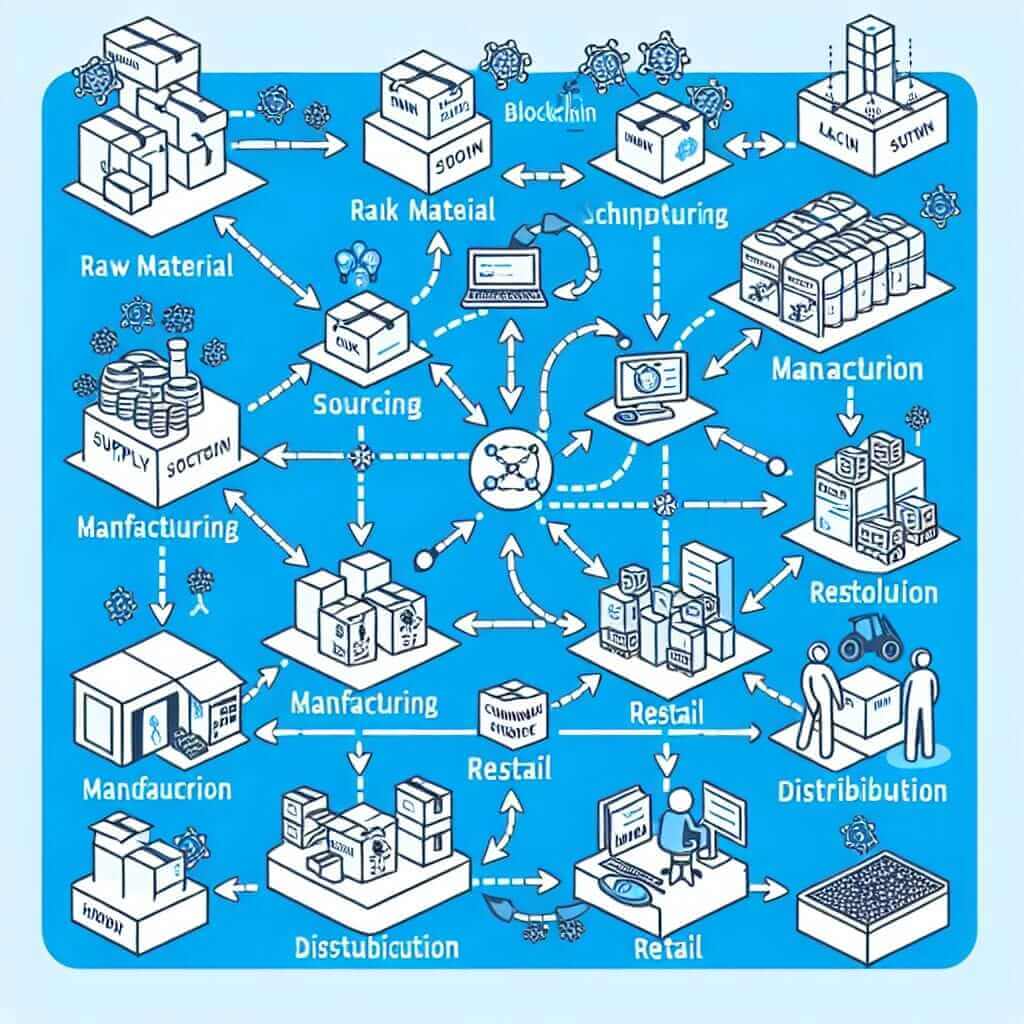The Reading section of the IELTS exam can be particularly challenging, with topics often drawing from a variety of academic and professional fields. One such area of growing interest is the use of blockchain technology in supply chain management. Understanding how blockchain is transforming supply chain management is crucial, as this topic is increasingly relevant in the current digital age and may appear in future IELTS exams. In this article, we will delve into the application of blockchain technology in supply chain management, providing a comprehensive reading passage and associated practice questions to help you prepare effectively.
Main Content
Reading Passage: The Role of Blockchain in Supply Chain Management
Easy Text
Blockchain technology has emerged as a significant innovation with the potential to revolutionize various industries, including supply chain management. At its core, blockchain is a decentralized ledger that records transactions across multiple computers, ensuring transparency and security. In supply chain management, blockchain provides a robust solution to many challenges, such as provenance tracking, fraud prevention, and operational inefficiencies.
Provenance tracking is essential in supply chains, especially for high-value goods like electronics, luxury items, and pharmaceuticals. Blockchain allows every transaction and movement of these goods to be recorded immutably, ensuring that stakeholders can verify the origin and journey of a product. This traceability is crucial for ensuring authenticity and compliance with regulatory standards.
Fraud prevention is another critical application of blockchain in supply chains. By providing a transparent and tamper-proof ledger, blockchain reduces the risk of fraudulent activities, such as counterfeiting and false claims. This heightened security builds trust among partners and consumers, reducing losses and enhancing brand reputation.
Operational efficiency in supply chains can also benefit from blockchain technology. Blockchain facilitates better communication and coordination among supply chain participants by providing real-time data accessible to all authorized parties. This enhanced visibility can lead to improved logistics, inventory management, and demand forecasting, ultimately reducing costs and increasing efficiency.
In conclusion, blockchain technology is becoming an integral tool in modern supply chain management. Its ability to provide secure, transparent, and efficient solutions makes it an invaluable asset for companies looking to streamline their operations and enhance trust within their supply chains.

Practice Questions
Multiple Choice
-
What is one primary benefit of using blockchain in supply chain management?
- A. Lower production costs
- B. Enhanced transparency
- C. Improved product design
- D. Increased marketing budget
-
How does blockchain help in fraud prevention within the supply chain?
- A. By reducing manufacturing costs
- B. By providing a tamper-proof ledger
- C. By enhancing product design
- D. By improving marketing strategies
Identifying Information (True/False/Not Given)
- Blockchain technology can reduce the number of intermediaries in supply chains.
- Blockchain makes it impossible for counterfeit products to enter the supply chain.
- Blockchain technology’s impact on operational efficiency in supply chains has not yet been proven.
Matching Headings
- Paragraph 1: Introduction to Blockchain Technology
- Paragraph 2: Provenance Tracking
- Paragraph 3: Fraud Prevention
- Paragraph 4: Operational Efficiency
- Paragraph 5: Conclusion
Answer Keys and Explanations
-
B. Enhanced transparency – Blockchain ensures transparency by recording transactions on a decentralized ledger accessible to all authorized participants.
-
B. By providing a tamper-proof ledger – Blockchain’s immutable ledger minimizes fraudulent activities by making it nearly impossible to alter transaction records.
-
True – Blockchain reduces the need for intermediaries by providing a direct, transparent way for parties to interact.
-
False – While blockchain significantly reduces the likelihood of counterfeit products, it does not make it entirely impossible.
-
Not Given – The passage does not provide conclusive evidence regarding the proven impact of blockchain on operational efficiency.
-
6. Introduction to Blockchain Technology – The first paragraph introduces blockchain technology and its relevance to supply chain management.
-
7. Provenance Tracking – The second paragraph discusses how blockchain enhances provenance tracking.
-
8. Fraud Prevention – The third paragraph focuses on how blockchain helps prevent fraud.
-
9. Operational Efficiency – The fourth paragraph explains how blockchain improves operational efficiency.
-
10. Conclusion – The fifth paragraph summarizes the benefits of blockchain in supply chain management.
Common Errors in Reading Section
- Overlooking Details: Always pay close attention to specific details mentioned in the passage. Misinterpreting key points can lead to incorrect answers.
- Ignoring Context: Ensure to read around the mentioned keywords to fully understand the context in which they are used.
- Struggling with Vocabulary: Make an effort to understand the meanings of complex or unfamiliar words from the context.
Vocabulary
- Provenance (noun): /ˈprovənəns/ – The place of origin or earliest known history of something.
- Ledger (noun): /ˈlejər/ – A book or other collection of financial accounts.
- Immutable (adjective): /ɪˈmjuːtəbl/ – Unchanging over time or unable to be changed.
- Fraudulent (adjective): /ˈfrɔːdʒələnt/ – Obtained, done by, or involving deception, especially criminal deception.
- Tamper-proof (adjective): – Designed to prevent tampering or unauthorized access.
Grammar Focus
Present Continuous Tense:
- Form: am/is/are + verb-ing
- Usage: Used to talk about actions that are happening at the moment of speaking.
- Example: “Blockchain technology is transforming supply chain management.”
Conclusion
For a solid preparation for the Reading section of the IELTS exam, ensure to familiarize yourself with diverse topics and practice a variety of questions. Blockchain technology in supply chain management is a current and relevant topic, making it a valuable area to study. Consistent practice with such passages and a focus on understanding complex vocabulary and grammar can significantly enhance your performance.
For more insights on related topics, you can read articles like “How is AI Being Used to Enhance Supply Chain Management?” and “How is Blockchain Technology Being Used in Supply Chain Traceability?”.
Remember, thorough preparation and a strategic approach will go a long way in helping you excel in the IELTS Reading section. Good luck!